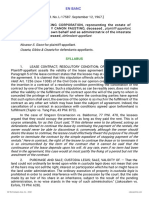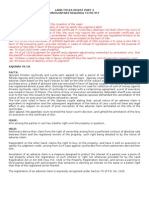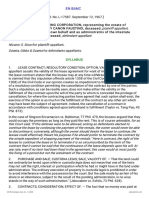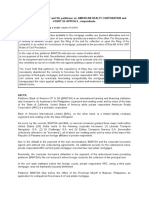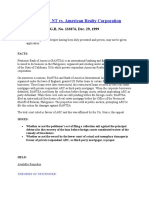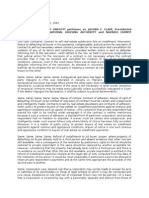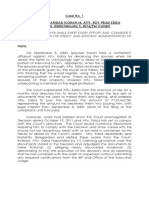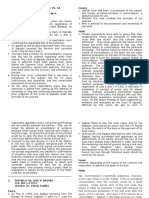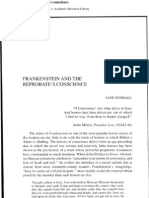0 ratings0% found this document useful (0 votes)
54 viewsCivil Code Keywords
This document summarizes several civil code cases related to contracts, obligations, property law, and family law. Key points include:
1. Rescission of a contract entails mutual restitution of benefits and the injured party is entitled to damages. Consignation, or depositing money owed with a court, can extinguish an obligation without prior payment when certain conditions are met.
2. In ejectment cases, the sole issue is physical possession, not legal ownership. Prior physical possession is a primary consideration. Judgments are binding between parties and successors.
3. Public plazas cannot be appropriated or subject to contracts as they are public property. Contracts involving public property are void.
Uploaded by
MhayBinuyaJuanzonCopyright
© © All Rights Reserved
Available Formats
Download as DOCX, PDF, TXT or read online on Scribd
0 ratings0% found this document useful (0 votes)
54 viewsCivil Code Keywords
This document summarizes several civil code cases related to contracts, obligations, property law, and family law. Key points include:
1. Rescission of a contract entails mutual restitution of benefits and the injured party is entitled to damages. Consignation, or depositing money owed with a court, can extinguish an obligation without prior payment when certain conditions are met.
2. In ejectment cases, the sole issue is physical possession, not legal ownership. Prior physical possession is a primary consideration. Judgments are binding between parties and successors.
3. Public plazas cannot be appropriated or subject to contracts as they are public property. Contracts involving public property are void.
Uploaded by
MhayBinuyaJuanzonCopyright
© © All Rights Reserved
Available Formats
Download as DOCX, PDF, TXT or read online on Scribd
You are on page 1/ 5
CIVIL CODE
Contract; Rescission; Effect.
Rescission entails a mutual restitution of benefits received. An
injured party who has chosen rescission is also entitled to the
payment of damages.
Sandoval Shipyards, Inc. v. PMMA, G.R. No. 188633. April 10, 2013
Obligation; Extinguishment of obligations; Consignation; When
tender of payment not necessary; Judicial in character;
Difference between consignation and tender of payment.
Under Article 1256 of the Civil Code, the debtor shall be released
from responsibility by the consignation of the thing or sum due,
without need of prior tender of payment, when the creditor is absent
or unknown, or when he is incapacitated to receive the payment at
the time it is due, or when two or more persons claim the same right
to collect, or when the title to the obligation has been lost.
Consignation is necessarily judicial. Article 1258 of the Civil Code
specifically provides that consignation shall be made by depositing
the thing or things due at the disposal of judicial authority. The said
provision clearly precludes consignation in venues other than the
courts.
Elsewhere, what may be made is a valid tender of payment, but not
consignation. The two, however, must be distinguished.
Tender of payment must be distinguished from consignation. Tender
is the antecedent of consignation, that is, an act preparatory to the
consignation, which is the principal, and from which are derived the
immediate consequences which the debtor desires or seeks to
obtain. Tender of payment may be extrajudicial, while consignation is
necessarily judicial, and the priority of the first is the attempt to make
a private settlement before proceeding to the solemnities of
consignation. (8 Manresa 325).
Sps. Cacayorin v. Armed Forces and Police Mutual Benefit
Association, Inc., G.R. No. 171298. April 15, 2013
Property; Ejectment; only issue is who is entitled to physical
possession; forcible entry; prior physical possession is vital;
judgment conclusive between the parties and their successorsin-interest; effects if prevailing party is a usufructuary; usufruct;
death of usufructuary extinguishes usufruct.
Ejectment cases forcible entry and unlawful detainer are
summary proceedings designed to provide expeditious means to
protect actual possession or the right to possession of the property
involved. The only question that the courts resolve in ejectment
proceedings is: who is entitled to the physical possession of the
premises, that is, to the possession de facto and not to the
possession de jure. It does not even matter if a partys title to the
property is questionable. Thus, an ejectment case will not
necessarily be decided in favor of one who has presented proof of
ownership of the subject property.
Indeed, possession in ejectment cases means nothing more than
actual physical possession, not legal possession in the sense
contemplated in civil law. In a forcible entry case, prior physical
possession is the primary consideration[.] A party who can prove
prior possession can recover such possession even against the
owner himself. Whatever may be the character of his possession, if
he has in his favor prior possession in time, he has the security that
entitles him to remain on the property until a person with a better right
lawfully ejects him. [T]he party in peaceable, quiet possession shall
not be thrown out by a strong hand, violence, or terror.
The judgment in an ejectment case is conclusive between the parties
and their successors-in interest by title subsequent to the
commencement of the action; hence, it is enforceable by or against
the heirs of the deceased. This judgment entitles the winning party
to: (a) the restitution of the premises, (b) the sum justly due as
arrears of rent or as reasonable compensation for the use and
occupation of the premises, and (c) attorneys fees and costs.
[T]he right to the usufruct is now rendered moot by the death of
Wilfredo since death extinguishes a usufruct under Article 603(1) of
the Civil Code. This development deprives the heirs of the
usufructuary the right to retain or to reacquire possession of the
property even if the ejectment judgment directs its restitution.
Thus, what actually survives under the circumstances is the award of
damages, by way of compensation.
Rivera-Calingasan v. Rivera; G.R. No. 171555. April 17, 2013
Property; Public property; public plaza forms part of the public
dominion; cannot be the object of appropriation, lease, any
other contractual undertaking; void contracts.
A public plaza is for public use and therefore forms part of the public
dominion. Accordingly, it cannot be the object of appropriation either
by the State or by private persons. Nor can it be the subject of lease
or any other contractual undertaking. In Villanueva v. Castaeda, Jr.,
citing Espiritu v. Municipal Council of Pozorrubio, the Court
pronounced that:
x x x Town plazas are properties of public dominion, to be devoted to
public use and to be made available to the public in general. They are
outside the commerce of man and cannot be disposed of or even
leased by the municipality to private parties.
In this relation, Article 1409(1) of the Civil Code provides that a
contract whose purpose is contrary to law, morals, good customs,
public order or public policy is considered void and as such, creates
no rights or obligations or any juridical relations.
Land Bank of the Philippines v. Cacayurin; G.R. No. 191667. April 17,
2013
SPECIAL LAWS
Foreclosure of Mortgage pursuant to P.D. No. 385; when its
purpose is served; when hearing is necessary before issuance
of writ of possession; foreclosure of mortgage under Section 33,
Rule 39 of the Rules on Civil Procedure; when issuance of writ
of possession is not ministerial.
Indeed, while the Court had already declared in Philippine National
Bank v. Adil that once the property of a debtor is foreclosed and sold
to a GFI, it would be mandatory for the court to place the GFI in the
possession and control of the propertypursuant to Section 4 of P.D.
No. 385 (Requiring Government Financial Institutions to Foreclose
Mandatorily All Loans with Arrearages, Including Interest and
Charges Amounting to at Least Twenty (20%) of the Total
Outstanding Obligation) this rule should not be construed as
absolute or without exception.
The evident purpose underlying P.D. 385 is sufficiently served by
allowing foreclosure proceedings initiated by GFIs to continue until a
judgment therein becomes final and executory, without a restraining
order, temporary or permanent injunction against it being issued. But
if a parcel of land is occupied by a party other than the judgment
debtor, the proper procedure is for the court to order a hearing to
determine the nature of said adverse possession before it issues a
writ of possession. This is because a third party, who is not privy to
the debtor, is protected by the law. Such third party may be ejected
from the premises only after he has been given an opportunity to be
heard, to comply with the time honored principle of due process.
In the same vein, under Section 33 of Rule 39 of the Rules on Civil
Procedure, the possession of a mortgaged property may be awarded
to a purchaser in the extrajudicial foreclosure, unless a third party is
actually holding the property adversely vis--vis the judgment debtor.
The obligation of a court to issue a writ of possession in favor of the
purchaser in an extrajudicial foreclosure sale ceases to be ministerial,
once it appears that there is a third party who is in possession of the
property and is claiming a right adverse to that of the
debtor/mortgagor. The Supreme Court explained in Philippine
National Bank v. Austria that the foregoing doctrinal pronouncements
are not without support in substantive law:
x x x. Notably, the Civil Code protects the actual possessor of a
property, to wit:
Art. 433. Actual possession under claim of ownership raises a
disputable presumption of ownership. The true owner must resort to
judicial process for the recovery of the property.
Under the aforequoted provision, one who claims to be the owner of a
property possessed by another must bring the appropriate judicial
action for its physical recovery. The term judicial process could
mean no less than an ejectment suit or reivindicatory action, in which
the ownership claims of the contending parties may be properly heard
and adjudicated.
Royal Savings Bank v. Asia, et al.; G.R. No. 183658. April 10, 2013
Family Code; Declaration of Presumptive Death; judgment is
immediately final and executory; proper remedy is a special civil
action for certiorari filed in the Court of Appeals; decision of
Court of Appeals reviewable by the Supreme Court via certiorari
under Rule 45.
It is improper to avail of an ordinary appeal as a vehicle for
questioning a trial courts decision in a summary proceeding for the
declaration of presumptive death under Article 41 of the Family Code.
As explained in Republic v. Tango, the remedy of a losing party in a
summary proceeding is not an ordinary appeal, but a petition for
certiorari, to wit:
By express provision of law, the judgment of the court in a summary
proceeding shall be immediately final and executory. As a matter of
course, it follows that no appeal can be had of the trial courts
judgment in a summary proceeding for the declaration of presumptive
death of an absent spouse under Article 41 of the Family Code. It
goes without saying, however, that an aggrieved party may file a
petition for certiorari to question abuse of discretion amounting to lack
of jurisdiction. Such petition should be filed in the Court of Appeals in
accordance with the Doctrine of Hierarchy of Courts. To be sure, even
if the Courts original jurisdiction to issue a writ of certiorari is
concurrent with the RTCs and the Court of Appeals in certain cases,
such concurrence does not sanction an unrestricted freedom of
choice of court forum. From the decision of the Court of Appeals, the
losing party may then file a petition for review on certiorari under Rule
45 of the Rules of Court with the Supreme Court. This is because the
errors which the court may commit in the exercise of jurisdiction are
merely errors of judgment which are the proper subject of an appeal.
When the OSG filed its notice of appeal under Rule 42, it availed
itself of the wrong remedy. As a result, the running of the period for
filing of a Petition for Certiorari continued to run and was not tolled.
Upon lapse of that period, the Decision of the RTC could no longer be
questioned.
Republic of the Philippines v. Narceda; G.R. No. 182760. April 10,
2013.
You might also like
- Suggested Answers To The Merc Bar by Fiscal Rocille Aquino Tambasacan100% (1)Suggested Answers To The Merc Bar by Fiscal Rocille Aquino Tambasacan16 pages
- 5 Bank - of - America - v. - American - Realty - Corp.No ratings yet5 Bank - of - America - v. - American - Realty - Corp.17 pages
- Heirs of Tunged Vs Sto Lucia Realty: JurisdictionNo ratings yetHeirs of Tunged Vs Sto Lucia Realty: Jurisdiction15 pages
- 17 Bank of America Vs American Realty CorporationNo ratings yet17 Bank of America Vs American Realty Corporation17 pages
- Conflict of Laws/Private International Law Hilton v. Guyot Llorente v. CANo ratings yetConflict of Laws/Private International Law Hilton v. Guyot Llorente v. CA40 pages
- 143713-1967-Philippine Banking Corp. v. Lui SheNo ratings yet143713-1967-Philippine Banking Corp. v. Lui She17 pages
- G.R. No. 133876. December 29, 1999. Bank of America, NT and Sa, Petitioner, vs. American Realty CORPORATION and COURT OF APPEALS, RespondentsNo ratings yetG.R. No. 133876. December 29, 1999. Bank of America, NT and Sa, Petitioner, vs. American Realty CORPORATION and COURT OF APPEALS, Respondents7 pages
- Metropolitan Bank Trust Co. v. Alejo20200913-8-1dz9nzfNo ratings yetMetropolitan Bank Trust Co. v. Alejo20200913-8-1dz9nzf12 pages
- A.2. Banco Espanol Filipina v. Palanca 37 Phil.921No ratings yetA.2. Banco Espanol Filipina v. Palanca 37 Phil.92116 pages
- China Banking Corporation v. Ordinario, We Held That Under Section 7 of Act No. 3135, TheNo ratings yetChina Banking Corporation v. Ordinario, We Held That Under Section 7 of Act No. 3135, The7 pages
- Rule 67-71 Notes-in-Special-Civil-Action-Part-IINo ratings yetRule 67-71 Notes-in-Special-Civil-Action-Part-II19 pages
- Carandang v. Heirs of de Guzman (G.R. No. 160347, November 29, 2006)100% (1)Carandang v. Heirs of de Guzman (G.R. No. 160347, November 29, 2006)3 pages
- Philippine Coconut Federation Inc., vs. SandiganbayanNo ratings yetPhilippine Coconut Federation Inc., vs. Sandiganbayan7 pages
- Milagros Hernandez vs. Edwina Ocampo Et. Al.No ratings yetMilagros Hernandez vs. Edwina Ocampo Et. Al.3 pages
- Divinagracia vs. Parilla, G.R. No. 196750, March 11, 2015 Topic: Rule 3 Parties To Civil ActionNo ratings yetDivinagracia vs. Parilla, G.R. No. 196750, March 11, 2015 Topic: Rule 3 Parties To Civil Action13 pages
- G.R. No. 104269 November 11, 1993 Department of Agriculture vs. The National Labor Relations COMMISSION, Et Al. Doctrine of Non-Suability of The State. Facts: Implied ConsentNo ratings yetG.R. No. 104269 November 11, 1993 Department of Agriculture vs. The National Labor Relations COMMISSION, Et Al. Doctrine of Non-Suability of The State. Facts: Implied Consent2 pages
- Alvin Patrimonio, Petitioner, vs. Napoleon Gutier Rez and Octavio Marasigan Iii, RespondentsNo ratings yetAlvin Patrimonio, Petitioner, vs. Napoleon Gutier Rez and Octavio Marasigan Iii, Respondents8 pages
- Bar Probables Obligations and ContractsNo ratings yetBar Probables Obligations and Contracts87 pages
- Civpro - METROBANK V. ALEJO - 141970 - SanchezNo ratings yetCivpro - METROBANK V. ALEJO - 141970 - Sanchez2 pages
- California Supreme Court Petition: S173448 – Denied Without OpinionFrom EverandCalifornia Supreme Court Petition: S173448 – Denied Without Opinion4/5 (1)
- Succession Reviewer Carmelita B. JuanzonNo ratings yetSuccession Reviewer Carmelita B. Juanzon69 pages
- Canon 12 - A Lawyer Shall Exert Every Effort and Consider It His Duty To Assist in The Speedy and Efficient Administration of JusticeNo ratings yetCanon 12 - A Lawyer Shall Exert Every Effort and Consider It His Duty To Assist in The Speedy and Efficient Administration of Justice10 pages
- Good Conduct Time Allowance or GCTA Is The Most Important Alphabetical Representation To The Prisoner100% (1)Good Conduct Time Allowance or GCTA Is The Most Important Alphabetical Representation To The Prisoner2 pages
- Frankenstein and The Reprobate's ConscienceNo ratings yetFrankenstein and The Reprobate's Conscience25 pages
- GOSA Renewal Rescue Pack - EXPIRED LICENCES HELPNo ratings yetGOSA Renewal Rescue Pack - EXPIRED LICENCES HELP25 pages
- Hussainara Khatoon and Ors Vs Home Secretary States790121COM167024No ratings yetHussainara Khatoon and Ors Vs Home Secretary States790121COM1670248 pages
- Worksheet Physics High School Electric Circuits 0No ratings yetWorksheet Physics High School Electric Circuits 02 pages
- CIENCIA DE LOS MATERIALES - Wenceslao Gonzalez, Viña Hector ManciniNo ratings yetCIENCIA DE LOS MATERIALES - Wenceslao Gonzalez, Viña Hector Mancini40 pages
- Civil Procedure: I. COMPLAINT (In Some Actions0% (1)Civil Procedure: I. COMPLAINT (In Some Actions3 pages
- Civil Law: Persons and Family RelationsNo ratings yetCivil Law: Persons and Family Relations49 pages
- Mineral Production Sharing Agreement (MPSA)No ratings yetMineral Production Sharing Agreement (MPSA)4 pages
- TESTATE ESTATE OF JOSE EUGENIO RAMIREZ vs. RamirezNo ratings yetTESTATE ESTATE OF JOSE EUGENIO RAMIREZ vs. Ramirez2 pages
- Robert Wade Wetzel, Jr. v. Lawrence Hoffman, City of Sunrise, A Florida Municipal Corporation, 928 F.2d 376, 11th Cir. (1991)No ratings yetRobert Wade Wetzel, Jr. v. Lawrence Hoffman, City of Sunrise, A Florida Municipal Corporation, 928 F.2d 376, 11th Cir. (1991)4 pages
- Order For Tedi Hedstrom To Surrender LicenseNo ratings yetOrder For Tedi Hedstrom To Surrender License6 pages
- Simple Guide for Drafting of Civil Suits in IndiaFrom EverandSimple Guide for Drafting of Civil Suits in India
- Suggested Answers To The Merc Bar by Fiscal Rocille Aquino TambasacanSuggested Answers To The Merc Bar by Fiscal Rocille Aquino Tambasacan
- 5 Bank - of - America - v. - American - Realty - Corp.5 Bank - of - America - v. - American - Realty - Corp.
- Conflict of Laws/Private International Law Hilton v. Guyot Llorente v. CAConflict of Laws/Private International Law Hilton v. Guyot Llorente v. CA
- G.R. No. 133876. December 29, 1999. Bank of America, NT and Sa, Petitioner, vs. American Realty CORPORATION and COURT OF APPEALS, RespondentsG.R. No. 133876. December 29, 1999. Bank of America, NT and Sa, Petitioner, vs. American Realty CORPORATION and COURT OF APPEALS, Respondents
- Metropolitan Bank Trust Co. v. Alejo20200913-8-1dz9nzfMetropolitan Bank Trust Co. v. Alejo20200913-8-1dz9nzf
- A.2. Banco Espanol Filipina v. Palanca 37 Phil.921A.2. Banco Espanol Filipina v. Palanca 37 Phil.921
- China Banking Corporation v. Ordinario, We Held That Under Section 7 of Act No. 3135, TheChina Banking Corporation v. Ordinario, We Held That Under Section 7 of Act No. 3135, The
- Carandang v. Heirs of de Guzman (G.R. No. 160347, November 29, 2006)Carandang v. Heirs of de Guzman (G.R. No. 160347, November 29, 2006)
- Philippine Coconut Federation Inc., vs. SandiganbayanPhilippine Coconut Federation Inc., vs. Sandiganbayan
- Divinagracia vs. Parilla, G.R. No. 196750, March 11, 2015 Topic: Rule 3 Parties To Civil ActionDivinagracia vs. Parilla, G.R. No. 196750, March 11, 2015 Topic: Rule 3 Parties To Civil Action
- G.R. No. 104269 November 11, 1993 Department of Agriculture vs. The National Labor Relations COMMISSION, Et Al. Doctrine of Non-Suability of The State. Facts: Implied ConsentG.R. No. 104269 November 11, 1993 Department of Agriculture vs. The National Labor Relations COMMISSION, Et Al. Doctrine of Non-Suability of The State. Facts: Implied Consent
- Alvin Patrimonio, Petitioner, vs. Napoleon Gutier Rez and Octavio Marasigan Iii, RespondentsAlvin Patrimonio, Petitioner, vs. Napoleon Gutier Rez and Octavio Marasigan Iii, Respondents
- California Supreme Court Petition: S173448 – Denied Without OpinionFrom EverandCalifornia Supreme Court Petition: S173448 – Denied Without Opinion
- Canon 12 - A Lawyer Shall Exert Every Effort and Consider It His Duty To Assist in The Speedy and Efficient Administration of JusticeCanon 12 - A Lawyer Shall Exert Every Effort and Consider It His Duty To Assist in The Speedy and Efficient Administration of Justice
- Good Conduct Time Allowance or GCTA Is The Most Important Alphabetical Representation To The PrisonerGood Conduct Time Allowance or GCTA Is The Most Important Alphabetical Representation To The Prisoner
- Hussainara Khatoon and Ors Vs Home Secretary States790121COM167024Hussainara Khatoon and Ors Vs Home Secretary States790121COM167024
- CIENCIA DE LOS MATERIALES - Wenceslao Gonzalez, Viña Hector ManciniCIENCIA DE LOS MATERIALES - Wenceslao Gonzalez, Viña Hector Mancini
- TESTATE ESTATE OF JOSE EUGENIO RAMIREZ vs. RamirezTESTATE ESTATE OF JOSE EUGENIO RAMIREZ vs. Ramirez
- Robert Wade Wetzel, Jr. v. Lawrence Hoffman, City of Sunrise, A Florida Municipal Corporation, 928 F.2d 376, 11th Cir. (1991)Robert Wade Wetzel, Jr. v. Lawrence Hoffman, City of Sunrise, A Florida Municipal Corporation, 928 F.2d 376, 11th Cir. (1991)












